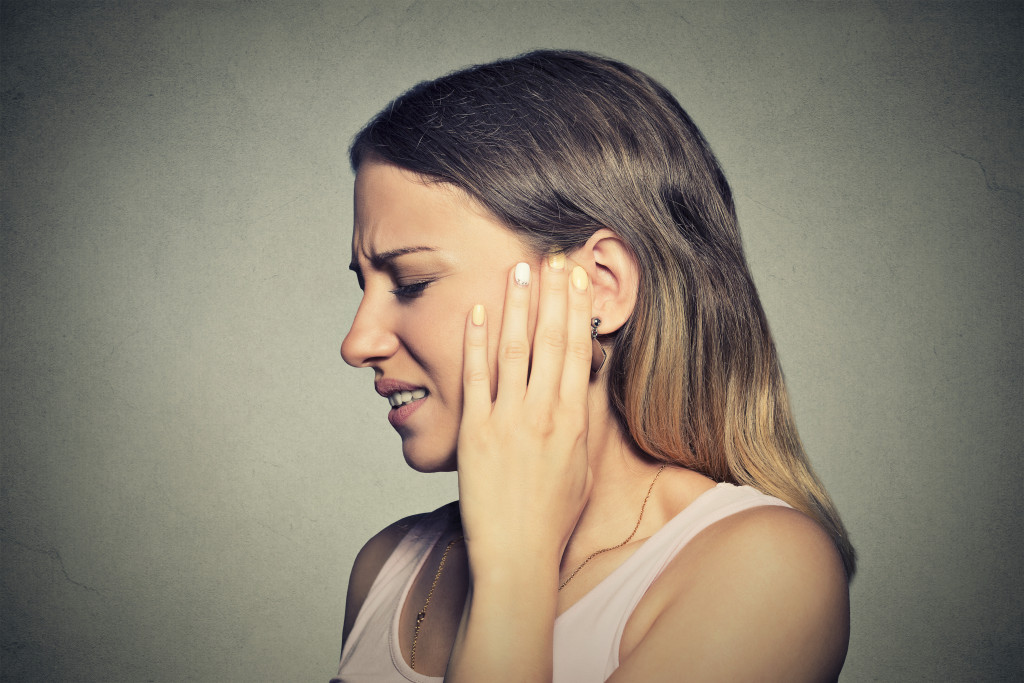- Stress can directly impact your hearing and ear health, including an increased risk of developing hearing loss.
- Permanent hearing impairment caused by nerve damage may be linked to stress and can be diagnosed medically.
- Tinnitus is a common auditory phenomenon experienced by many people due to various factors, like exposure to loud noise.
- Stress reduction techniques such as breathwork, exercise, yoga, mindfulness meditation, etc., can help combat stress and improve overall mental health.
- Self-care is essential for maintaining good mental, physical, and emotional well-being; taking proactive steps towards self-care.
Stress has been known to take its toll on your health in various ways, from sleepless nights to weakened immunity. But, what many don’t realize is that stress can also have a direct impact on your hearing and ear health. It’s essential to be aware of the connections between high levels of stress and their effects on the ears.
This article will explore how stress impacts our ear health and discuss strategies better to manage your stress levels and your ear health.
What is Stress and How Does it Affect Your Hearing Capacity
Stress is the feeling of being overwhelmed by psychological or physical pressures, and it can have severe implications on your overall health and, in particular, your hearing capacity. Studies have found that when you are under a lot of stress, usually caused by anxiety or depression, it can increase the chances of developing hearing loss as well as cause a reduction in the efficacy of existing hearing aids.
When facing stressful situations, the biological “fight or flight” response kicks in, causing an influx of hormones such as cortisol which acts on the parts of the brain responsible for processing sound. As a result, this makes it much more difficult to accurately pick up auditory signals, meaning that stressful people may struggle to differentiate between different speech tones and sounds.
Therefore, if you find yourself facing periods of significant stress or anxiety, it is crucial to be mindful of your hearing health and get tested regularly.

Types of Hearing Loss Associated With Stress
Stress can be one of the most debilitating agents for humans, but did you know it can also cause hearing loss? Stress-induced hearing loss is real damage from being overly stressed regularly.
Sensorineural Hearing Loss
Sensorineural hearing loss is a form of permanent hearing impairment resulting from damage to the nerves and hair cells in the inner ear. This hearing loss affects the transmission of sound signals to the brain. It can be caused by a variety of factors, such as exposure to loud noises, diseases that attack the auditory nerve, certain medications, physical trauma, or even genetic disposition.
When sensorineural hearing loss is suspected, diagnosis typically involves an audiometric evaluation and medical imaging to determine any abnormality or blockage within the middle or inner ear. Treatment options include lifestyle adjustments, auditory therapy, and, if warranted, implantable hearing devices, which can help people with severe cases hear better.
Tinnitus
Tinnitus is an auditory phenomenon experienced by many people that affects their quality of life. Characterized by a ringing or buzzing sound in the ears, tinnitus can be caused by exposure to loud noise, allergies, high blood pressure, certain medications, and age-related hearing loss.
If you experience symptoms of tinnitus, it is vital to reach out to your healthcare provider specializing in tinnitus care. Your healthcare provider can help work through a comprehensive treatment plan depending on the severity and nature of your particular case.
It is also important to educate yourself about the causes of tinnitus and how to manage it best yourself—this could involve managing stress levels, avoiding environmental triggers such as loud noises, and seeking healthcare solutions like therapy or dietary adjustments designed for tinnitus relief.

Coping With Stress for Better Ear Health
Stress is often overlooked in relation to ear health, but studies show that stressful events or situations may be linked to an interruption of hearing mechanisms in some people. Coping with stress is integral to maintaining healthy ears and good hearing.
Stress Reduction Techniques
Many stress reduction techniques can help combat stress and improve one’s overall mental health. Breathwork, exercise, walking or jogging in nature, yoga, mindfulness meditation, writing in a journal, guided imagery, music therapy, and laughing are some of the most common strategies.
Talking with a trusted friend or family member about your worries and fears also appears helpful for reducing stress hormones. Additionally, it is recommended that one develops new hobbies and interests to distract from stressors using creativity and nourishing oneself with healthy lifestyle habits, including getting enough restful sleep and eating nutritious meals regularly.
With these methods regularly implemented, one can find improved mental well-being through decreased stress levels.
Importance of Self-care
Taking care of oneself is essential to mental, physical, and emotional well-being. Self-care can manifest in many forms–from exercise to practicing good hygiene—but it always involves intentionally caring for oneself. It encourages the development of healthy habits that may not come naturally.
When people prioritize self-care, they are more likely to engage in healthier relationships with others as well as a greater sense of balance, thereby improving their overall health. Too often, stressful environments can cause people to become overwhelmed, neglecting themselves in the process; however, taking proactive steps toward self-care will lead to improved well-being. This is critical for long-term success and happiness.

Stress can seriously affect hearing and put you at risk for hearing loss over time. It’s important to know the various types of stress-related hearing loss, such as sensorineural and tinnitus. While there is no magic cure for stress-related hearing problems, there are techniques you can use to cope with stress in healthier ways.
Maintaining balanced lifestyle habits, developing healthy coping skills through therapy or support groups, and engaging in activities that make you feel good are all excellent strategies for helping reduce stress levels to improve your ear health. Taking steps to manage stressful situations could be the key to keeping your ears safe.
